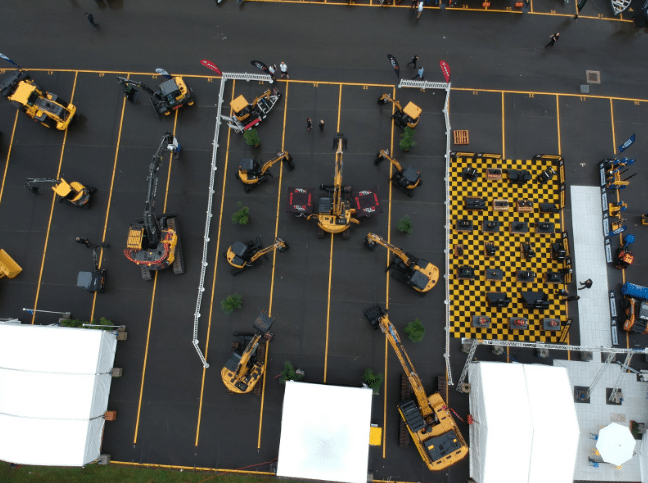Material handling plays a pivotal role across various sectors, including manufacturing, logistics, construction, and warehousing. It encompasses the movement, protection, storage, and control of materials throughout the production and distribution process.
Effective material handling solutions are essential for boosting productivity, cutting operational costs, ensuring workplace safety, and preserving the integrity of goods. As a leading provider of material handling equipment, Yello Equipment offers a wide range of solutions tailored to meet the evolving needs of modern industries.
This article delves into the significance of material handling, explores different types of equipment available, and provides insights into selecting optimal solutions for specific industrial applications.
The Importance of Material Handling
Material handling goes beyond mere transportation—it’s about streamlining material flow to ensure smooth operations. Strategically implementing material handling systems can significantly enhance efficiency by reducing waste, lowering handling costs, and improving inventory management. In industries dealing with substantial volumes and varieties of materials, choosing the right equipment and strategies becomes crucial for operational success.
Comprehensive Overview of Material Handling Equipment
Material handling equipment is categorised based on functionality, from systems designed for bulk handling to those tailored for itemised goods movement:
- Bulk Material Handling Equipment: This category includes devices for managing large volumes of loose materials like ores, grains, and sand. Examples include belt conveyors, bucket elevators, screw conveyors, and vibratory feeders. These systems are vital in industries such as mining, agriculture, and construction, facilitating efficient transport and processing of bulk materials.
- Engineered Systems: These complex, often automated solutions include Automated Storage and Retrieval Systems (ASRS), conveyor belt systems, and automated guided vehicles (AGVs). They are integral to modern warehousing and distribution centres, offering high efficiency, accuracy, and the ability to handle substantial volumes with minimal human intervention.
- Industrial Trucks: This diverse category features mobile equipment ranging from simple hand trucks and pallet jacks to sophisticated forklifts and side loaders. Industrial trucks offer mobility and flexibility in material movement across various environments, essential in almost all industrial settings for quick and safe goods transportation over short distances.
- Storage and Handling Equipment: Effective storage solutions, including racks, shelves, pallets, and bins, are crucial for organised material handling. These types of equipment not only maximise space utilisation but also enhance inventory management by providing easy access to stored materials, fundamental in maintaining order within warehouses and production facilities.
- Material Handling Machinery: This category includes various machines used for material handling tasks, such as cranes, hoists, and lifts. Material handling machinery enhances efficiency and safety in lifting and moving heavy or bulky materials, contributing to streamlined operations.
Selecting the Right Material Handling Solutions
Choosing appropriate material handling equipment is critical and should be based on a thorough analysis of operational requirements, including material nature, volume, and specific processes involved. Key considerations in selecting the right types of material handling equipment include:
- Operational Flexibility and Scalability: Equipment should meet current needs while accommodating future growth and changes in operational demand for long-term efficiency and cost-effectiveness.
- Safety and Ergonomics: Prioritise equipment that enhances safety and ergonomics to reduce workplace accidents and improve worker satisfaction.
- Environmental Impact: Sustainable solutions that minimise environmental impact are increasingly significant. Energy-efficient equipment that reduces waste contributes positively to environmental stewardship.
- Total Cost of Ownership: Beyond the purchase price, consider maintenance, operational, and potential downtime costs. Choose high-quality, durable equipment for significant long-term savings.
Future Trends in Material Handling
The future of material handling is marked by transformative changes driven by technology advancements and evolving industry needs. Trends such as increased automation, IoT device integration, and adopting sustainable practices are shaping the development of new solutions, promising enhanced efficiency, reduced manual labour, and more sustainable operational practices.
Final Words:
Material handling is integral to industrial operations, directly impacting productivity, costs, and safety. Selecting and implementing the right equipment is crucial for optimising workflows and achieving operational excellence. Businesses can make informed decisions supporting long-term success by understanding various types of material handling equipment and considering factors such as flexibility, safety, environmental impact, and total cost of ownership.
Looking for help with your material handling equipment?
Yello Equipment remains committed to providing comprehensive material handling solutions that meet modern industry needs, ensuring efficiency and productivity through quality equipment and exceptional service.
To learn more about our range of material handling machinery, give our knowledgeable team a call on 1300 093 556 or contact us through our website.
